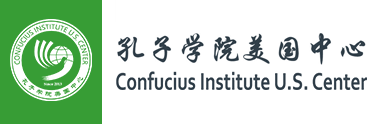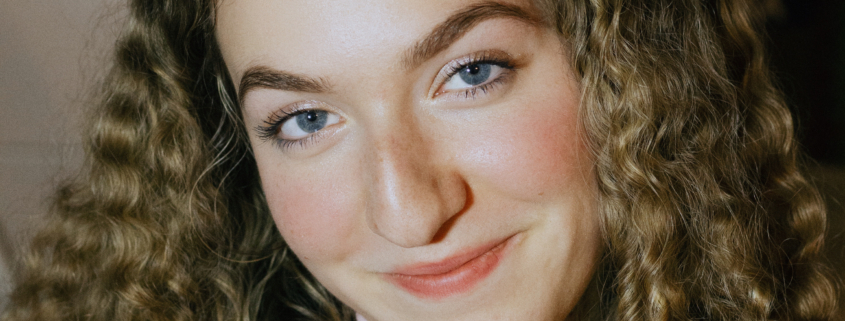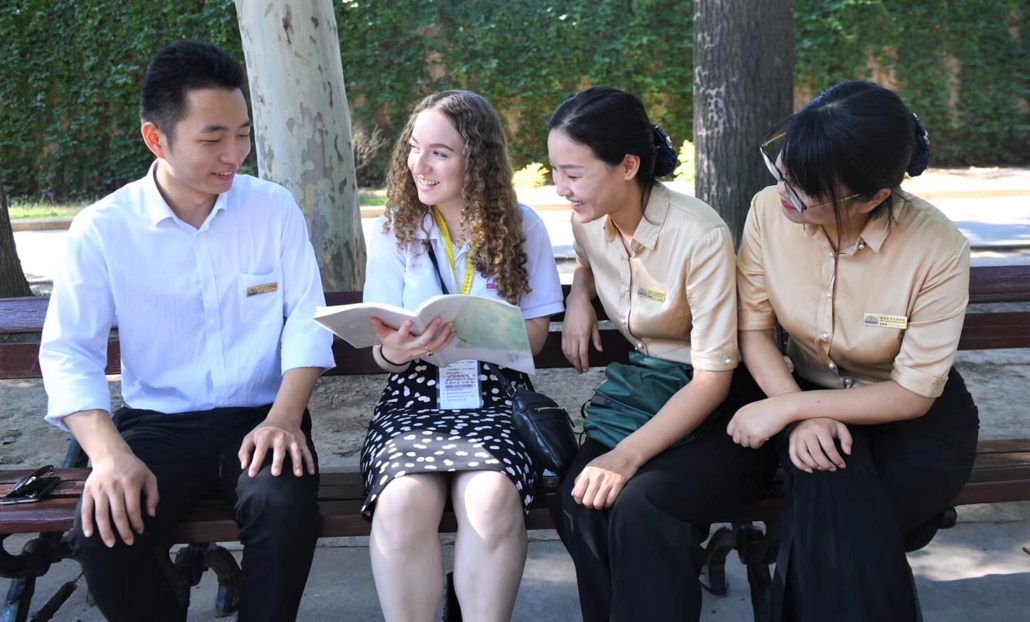Alana Barry
The Transcending Power of Cultural Exchange
By: Alana Barry
Though China and the United States lie on opposite ends of the globe, separated by the vast expanse of the Pacific Ocean, there are more opportunities for us to breach that distance than ever before.
Looking back on my own experiences with cultural exchange, I realize just how much I gained from them— those experiences hold the potential for us to change and enrich each other’s lives, simply by being and learning together.
My cultural exchange journey began in 2015, my junior year of high school, when I traveled to China to represent the U.S. in the Chinese Bridge Language Proficiency Competition. Upon landing in Kunming, each competing team was assigned a college-aged volunteer to help with preparations. Our volunteer’s name was Zhang Tingyu, a tall, patient, and funny Thai language major with a love of foreign TV dramas. She took us to visit some of Kunming’s famous tourist sites, and joined us in sampling some delicious local food. We hit it off immediately, and to this day, she’s still my first and best friend from China. After five intensive knockout rounds, my partner and I won first place in the Americas and third place in the world. In the airport, while in line to check our bags for the flight home, Tingyu gave me a postcard she’d written the night before. Even after everything I’d learned in the competition, I could barely recognize any of the characters, especially the Chinese proverb she’d written at the bottom of the card. I looked to her, disappointed, but she told me she knew I’d be able to read it one day. I couldn’t wait to prove her right.
Over the next two years, I continued to work on my Chinese, graduated high school, and packed two suitcases full of my worldly belongings to prepare for my next adventure. Thanks to the year-long scholarship awarded to me by Chinese Bridge as well as my teachers’ assistance, I was on track to spend my gap year at Fudan University in Shanghai in the fall of 2018. I knew that studying at Fudan would give me the opportunity to understand China on a deeper level, but I was pleasantly surprised when it opened the doors to the rest of the world as well. Before the start of the semester, each student was assigned to a class based on the results of their placement test. The International Cultural Exchange School at Fudan had students from all over the world— Italy, Japan, Indonesia, Thailand, Austria, Réunion, many places I’d never been to and some I’d barely even heard of. Early on, my classmates and I bonded over late-night games of mahjong, group lunches in the cafeteria, and naps on the lawn between classes. Few of them spoke English, so Chinese was our common thread. We shared the frustrations and joys of learning a second language, of having to pull out your dictionary in the middle of a conversation, of finally getting your point across after struggling to find the right words. Because we were all learning, we understood the importance of being patient with one another, and took the time to really listen.
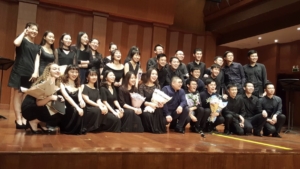 In addition to my academic experience, my time at Fudan also allowed me to explore a series of extracurricular activities and clubs. The first club to catch my eye was Echo, a chamber choir affiliated with the university. I’d sung in choirs since I was old enough to carry a tune, and a poster outside my classroom advertising one of their concerts piqued my interest. I signed up to audition, and soon enough, I joined the community. At first, as the only foreign member of the choir, I felt like a complete outsider. I remember my first day walking into practice, knowing no one, afraid I’d be stumped by a rehearsal conducted entirely in Chinese. But when the conductor picked up his baton, when we fell into the familiar routine of warmups and sight-read the first few bars of our new piece, I knew I was at home. Echo attracted both undergraduate and graduate students, as well as some who had joined the workforce. Many of the members belonged to several different choirs, and a few were professional singers. Although we were all from different walks of life, we were connected by our passion for creating beautiful music. Through Echo, we sang in Hebrew with the Shanghai Symphony Orchestra in their concert hall, sang sacred music in Latin at St. Peter’s Church to an audience so quiet you could hear a pin drop. After each concert, we always celebrated together, singing old favorites and toasting to the group’s hard work.
In addition to my academic experience, my time at Fudan also allowed me to explore a series of extracurricular activities and clubs. The first club to catch my eye was Echo, a chamber choir affiliated with the university. I’d sung in choirs since I was old enough to carry a tune, and a poster outside my classroom advertising one of their concerts piqued my interest. I signed up to audition, and soon enough, I joined the community. At first, as the only foreign member of the choir, I felt like a complete outsider. I remember my first day walking into practice, knowing no one, afraid I’d be stumped by a rehearsal conducted entirely in Chinese. But when the conductor picked up his baton, when we fell into the familiar routine of warmups and sight-read the first few bars of our new piece, I knew I was at home. Echo attracted both undergraduate and graduate students, as well as some who had joined the workforce. Many of the members belonged to several different choirs, and a few were professional singers. Although we were all from different walks of life, we were connected by our passion for creating beautiful music. Through Echo, we sang in Hebrew with the Shanghai Symphony Orchestra in their concert hall, sang sacred music in Latin at St. Peter’s Church to an audience so quiet you could hear a pin drop. After each concert, we always celebrated together, singing old favorites and toasting to the group’s hard work. 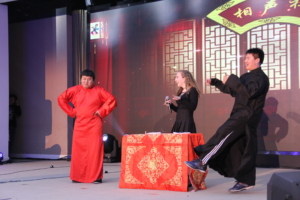
I also joined the crosstalk club: crosstalk, or xiangsheng, is a traditional Chinese performing art, a sort of stand-up comedy steeped in centuries of history and cultural references. The club met weekly to rehearse their skits, workshopping each other’s performances and encouraging the newcomers (like me) to learn tongue-twisters and beginners’ routines. Since we communicated solely in Chinese, practicing crosstalk was both frustrating and exhilarating, much like learning a language. Even the most basic of routines would inevitably contain some number of ancient stories, proverbs, or references that I’d never heard of and didn’t understand. My fellow club members took the time to walk me through each of those trouble spots, explaining them at length not just because they had to but because they genuinely wanted me to understand more about Chinese culture. By the end of the year, my partner and I had a skit prepared for their spring showcase— the first time the club had had international students perform in a show. We’d practiced the script until we were practically reciting it in our sleep. The show went off without a hitch, and we celebrated our success in typical crosstalk club fashion: copious amounts of late-night barbecue skewers. Both of these clubs allowed me to use my Chinese skills, albeit in very different ways. With Echo, I found a community that felt familiar. I was able to meet people with similar musical backgrounds to mine, and share in one of a kind experiences with them. It was thanks to my study of Chinese that I could make it through the audition, understand cues in rehearsal, and connect with my fellow singers. With the crosstalk club, I was able to build upon my existing knowledge of Chinese to explore a new art form that I knew almost nothing about. Beyond just the recitation and the performance itself, I learned more about the history of the art as well as folktales and proverbs. Without the basic foundations of the language, I would have no way to approach this multi-layered challenge.
In June of 2019, Tingyu took a few days off work to visit me in Shanghai. She designed an itinerary and took us to places I’d never been, even after living in the city for a whole year. After an adventure to an internet-famous bookstore, we sat on a bench outside, looking through photos from the day. I suddenly remembered I’d brought something, and dug around in my bag for a minute before pulling it out: the postcard she’d given me almost three years ago. We laughed about how discouraged I’d felt when I could barely read any of it, especially the proverb she’d told me was the most important: hai nei cun zhi ji, tian ya ruo bi lin. “As long as one has a close friend in this world, the ends of the earth seem like next door.”
The distance from my hometown of Washington, D.C. to Shanghai is just under 7,500 miles, and at times the gap in understanding between our two countries can seem vast. But in that moment, I thought about Tingyu and all the other wonderful people I’d met during my time in China. I thought about all the incredible experiences I’d had, all because I was able to study Chinese. I thought about the friendships I knew I’d take with me no matter where I go, and the world really did feel a little smaller. I know I’m incredibly lucky to have had these opportunities. If I could, I’d put everyone in the world on a plane to China.
But in the meantime, I’ll say it once more: cultural exchange changed my life, just as it’s changed the lives of many others. As long as we continue to value and cherish it, it will continue to make the world a better place, one experience at a time.
Alana Barry
Alana Barry is a junior double majoring in International Studies and East Asian Studies at Johns Hopkins University.
Her interest in China began early on, when she chose to take Mandarin as a language elective in the seventh grade. Throughout high school, she had several opportunities to travel to China, both through the government-sponsored Chinese Bridge language competition and her school’s China Fieldwork Semester program in Yunnan province. After graduation, she spent her gap year studying Chinese language, culture, and society at Fudan University’s International Cultural Exchange School. This experience intensified her passion, allowed her to explore, join student organizations, and become highly proficient in Mandarin.
In her free time, Alana enjoys listening to, playing, and writing music of all kinds. She loves to travel and is a major foodie.
After graduation, Alana hopes to apply her passion for Chinese culture, history, and language to a career in U.S.-China relations. She knows that no matter what she ends up doing, she’ll be sure to take the knowledge she gained from her experiences with cultural exchange with her into the future.
